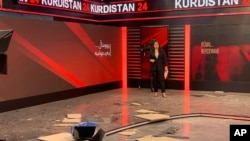ລູກສອນໄຟຂີປະນາວຸດຂອງອີຣ່ານ ໄດ້ຕົກລົງໃສ່ເມືອງເອີບິລ (Irbil) ໃນພາກ ເໜືອຂອງອີຣັກ
ຊຶ່ງໄດ້ທຳລາຍບ້ານເຮືອນ ແຕ່ບໍ່ໄດ້ເຮັດໃຫ້ມີຜູ້ເສຍຊີວິດ ຫລືບາດເຈັບລົ້ມຕາຍນັ້ນ ໄດ້ຖືກຕ້ອງຕິ
ໂດຍບັນດາຜູ້ນຳທາງການເມືອງໃນທົ່ວປະເທດອີຣັກ.
ກຳລັງພິທັກປະຕິວັດອິສລາມ (IRGC) ຂອງອີຣ່ານ ໄດ້ອ້າງເອົາຄວາມຮັບຜິດຊອບ ໃນການໂຈມຕີຕອນເດິກ ດ້ວຍການຍິງລູກສອນໄຟຂີປະນາວຸດ 12 ລູກ ໃສ່ອັນທີ່ມີການກ່າວຫາວ່າເປັນ “ສູນກາງຍຸດທະສາດຂອງການສົມຮູ້ຮ່ວມຄິດ” ຂອງອິສຣາແອລ ຢູ່ທີ່ຫົວເມືອງຂອງຊາວເຄີດດັ່ງກ່າວ ອີງຕາມຖະແຫຼງການ.
ມຸກຕາດາ ອາລ-ຊາເດີ (Muqtada al-Sadr) ນັກສອນສາດສະໜາ ທີີ່ມີອິດທິພົນ ຊຶ່ງພັກການ
ເມືອງຂອງລາວໄດ້ຊະນະບ່ອນນັ່ງສ່ວນຫຼາຍຢູ່ໃນການເລືອກຕັ້ງສະພາອີຣັກຫວ່າງມໍ່ໆມານີ້ ໄດ້ອອກຖະແຫຼງການ ຮຽກຮ້ອງໃຫ້ລັດຖະບານ “ສົ່ງໜັງສືປະທ້ວງຕໍ່ສະຫະປະຊາຊາດແລະແຈ້ງໃຫ້ເອກອັກຄະລັດຖະທູດອີຣ່ານ ຮັບປະກັນວ່າ ການໂຈມຕີດັ່ງກ່າວ ຈະບໍ່ເກີດຂຶ້ນອີກໃນອະນາຄົດ.
ບັນດານັກວິເຄາະກ່າວວ່າ ປະຕິກິລິຍາທີ່ຂ້ອນຂ້າງແຮງຂອງນັກສອນສາສະໜາ ອາລ-ຊາເດີ ຊຶ່ງຮ້າຍໄປກວ່າການກ່າວປະນາມນັ້ນ ສະແດງໃຫ້ເຫັນວ່າ ຄວາມນິຍົມຕໍ່ອີຣ່ານໄດ້ຫຼຸດນ້ອຍຖອຍລົງ ຢູ່ໃນປະເທດທີ່ອຸດົມຮັ່ງມີດ້ວຍນໍ້າມັນ ບ່ອນທີ່ອີຣ່ານໃຫ້ການໜູນຫຼັງບັນດາພັກການເມືອງຕ່າງໆ ໄດ້ເສຍໄຊໃນການເລືອກຕັ້ງສະພາຫວ່າງມໍ່ໆມານີ້.
ທ່ານມາກມູດ ອົດມານ (Mahmoud Othman) ນັກການເມືອງອະວຸໂສຊາວເຄີດທີ່ເຄີຍຮັບໃຊ້ເປັນສະມາຊິກຂອງສະພາອີຣັກ ໄດ້ກ່າວເຖິງການເຊື່ອມໂຍງໃນການໂຈມຕີຂອງອີຣ່ານ ໃສ່ກັບຂໍ້ຕົກລົງ
ທາງການເມືອງລະຫວ່າງຊາເດີ້ ກັບ ພັກປະຊາທິປະໄຕຊາວເຄີດ (KDP) ທີ່ໄດ້ປົກຄອງເອີບິລ ແລະພວກນັກການ ເມືອງນິກາຍຊູນນີ ໃຫ້ຈັດຕັ້ງລັດຖະບານ. ການຕົກລົງນີ້ບໍ່ໄດ້ຮວມເອົາບັນດາພັນ
ທະມິດນິກາຍຊີໄອທີ່ນິຍົມອີຣ່ານ ເຊັ່ນກຸ່ມພັນທະມິດຟາຕາ (Fatah.)
"ອີຣ່ານໄດ້ກ່າວຢ່າງເປີດເຜີຍວ່າ ຕົນຢູ່ເບື້ອງຫຼັງການໂຈມຕີ” ນັ້ນຄືຄຳເວົ້າຂອງທ່ານອົດມານ ໄດ້ກ່າວຕໍ່ ວີໂອເອ ໂດຍທາງໂທລະສັບ.
Iran’s ballistic missile strike on the northern city of Irbil, which damaged some residential structures but caused no casualties, has been criticized by leaders from across Iraq’s political spectrum.
Iran’s Revolutionary Guard Corps (IRGC) claimed credit for the late-night strike in which 12 ballistic missiles were fired against an alleged Israeli “strategic center of conspiracy” in the Kurdish city, according to a statement.
Muqtada al-Sadr, the influential Shiite cleric whose political party won majority seats in Iraq’s most recent parliamentary elections, issued a statement calling on the government to “submit a protest note to the United Nations and the Iranian ambassador asking for guarantees that [such an attack] will not be repeated in the future.”
Analysts say Sadr’s relatively strong reaction, which went beyond a mere condemnation, indicates Iran’s waning popularity in the oil-rich country, where Iran-backed political parties have lost ground in the recent parliamentary elections.
Mahmoud Othman, a veteran Kurdish politician who served as a member of the Iraqi parliament, tied the Iranian attack to a political deal between Sadr, the Kurdistan Democratic Party (KDP), which rules Irbil, and Sunni politicians to form a government. The agreement excludes Iran-allied Shiite parties, namely the Fatah Alliance.
“Iran has stated it publicly that it’s behind the attack,” Othman told VOA by phone.





